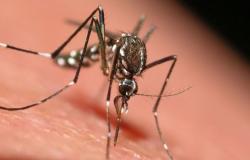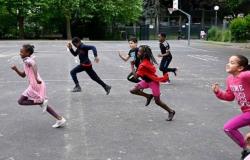If there is anyone who has experienced a before and after 2014, the year of the annexation of Crimea by Vladimir Putin, a trained historian capable of seeing how this 80th anniversary of D-Day can helping us understand the tragedy of war and what it costs to free oneself from the occupier is Jean-Yves Le Drian. Under François Hollande as with Emmanuel Macron, he pleaded for the balance of power with Putin’s Russia. Returning this week from a new mission in Lebanon, he answered our questions.
LA TRIBUNE SUNDAY – How will the D-Day anniversary ceremonies this year be different from those you experienced ten years ago, in 2014?
JEAN-YVES LE DRIAN – When we remember the ceremony of June 6, 2014, we get the strange impression that it was the last international act of a now bygone period, a sort of final step before the world turned upside down. Everyone was present: Queen Elizabeth II, President Obama, President Putin, Chancellor Merkel and many others, including representatives of what is now called the “Global South”. They had responded to President Hollande’s invitation to celebrate their newfound freedom and share the conviction that the world could live in peace on the basis of the principles developed at the end of the war. The major international collective security agreements were still in place, the relationship between NATO and Russia was functioning. The weather was nice, the atmosphere was relaxed… But ultimately it was only an appearance, cracks were already appearing with the rise of terrorism, the occupation of Crimea, the fighting in Donbass, like so many seeds of upheavals to come, even if no one anticipated the acceleration and scale of the ruptures.
Democratic Republic of Congo: this war we don’t want to see
At the time, François Hollande took advantage of the event to bring together the Russian and Ukrainian presidents. In what Is the Putin of today so different from the one of ten years ago?
The Russian regime has changed profoundly since then. He systematically trampled on all the agreements, all the principles which founded stability, security and peace in Europe. He led a severe repression against all political and intellectual opposition. He is militarizing Russian society. It invaded a neighboring democracy with openly revisionist intentions as part of an ideological and very concrete offensive against the West and, indeed, against Europe. If Putin thought it at the time without showing it, he took the most serious actions.
Are the parallels that we are tempted to draw between today’s Russian imperialism and the progressive invasion of Europe by the German army of the Nazi regime justified?
The paradox is that while claiming “denazify” Ukraine, one of its constantly stated war aims, the Russian regime has itself and alone reintroduced barbarism into the heart of Europe, to the point of being prosecuted by the International Criminal Court.
Do the differences today between Ukraine’s allies on the scope of the weapons delivered or the authorization to use them to strike Russian soil not serve Putin’s objectives?
What I remember for my part is first of all the unity of Europe, essentially preserved since the Russian invasion: condemnation, sanctions, common responses to a major energy crisis, political and financial support. and military to Ukraine. There are sometimes tactical differences, but more often than not they are overcome and there is agreement on the fundamental principles as well as the goal to be achieved. We have just seen this again on the protection of Kharkiv against strikes from Russian territory. Ukraine is today Europe’s first line of defense. Everyone is well aware of this.
Viktor Orbán’s Hungary continues to block the functioning of the European Peace Facility, which provides military assistance to Ukraine. Is this not a serious handicap for the EU in its desire to become powerful?
It is true that Hungary’s current blockage on the Facility is antigaming – if you allow me that expression. I hope that it will be overcome, as has happened in the past on important issues. I want to trust Hungary to fully assume the six-monthly European presidency from July 1 and not position itself outside the European Union.
Seven years after Donald Trump’s first NATO summit, have we made enough progress to no longer depend militarily on the American ally if he were to make us doubt his support?
If there is one point on which I agree with Donald Trump, it is when he emphasizes the insufficiency of European efforts for their own defense. For too long, too many allies have rested under the “American umbrella” without assuming their own responsibilities. The fact remains that major progress has been made over the last ten years, with spectacular developments, particularly financial, since the Russian invasion of Ukraine. But it’s not enough. We must reach a new level, as President Macron hoped in his second speech at the Sorbonne on April 24, to gain credibility and be ready to face the worst. We must collectively refrain from excessive dependence on a major ally whose commitment may clearly become uncertain. We can’t say we weren’t warned! The stronger Europe is, the stronger the link will be with the United States, not the opposite! This is the major issue in the June 9 elections. A powerful Europe that ensures its strategic autonomy. This is why I am fully committed to supporting the Need for Europe list led by Valérie Hayer.
Is there not basically a parallel risk, with the rise of the extreme right in Europe, of seeing the EU move further away from the United States and at the same time try to appease Russia?
The underlying tendency of the National Rally, regular support of the Russian regime, is well known and resurfaces at any time despite its attempts to hide it from the eyes of public opinion. But basically, there should be no ambiguity because there is an aggressor and an attacked. We must unwaveringly support the attacked without substituting themselves for their choices. The wish of the vast majority of Europeans is that Ukraine resists sufficiently to drive out the invading troops and regain its full territorial sovereignty. Ukraine must remain the decider of its own future.






